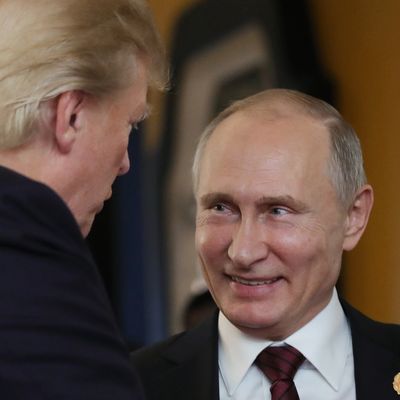
Now that President Trump has helpfully, if sarcastically, tweeted an analysis that Vladimir Putin has already won the Helsinki summit, what else is there to say?
Plenty. Washington’s response to the indictments of 12 Russian military intelligence officers handed down on Friday is a reminder of how Putin’s improvisational attacks on the institutions of Western democracy work. It’s not what he does to us, but what he goads us into doing to each other, like tearing apart the credibility of law enforcement or mistrusting our electoral processes. Foreign affairs has no “win” for the situation. No summit can fix it.
But plenty of other considerations make what happens in Helsinki matter. The U.S. and Russia still control the world’s two largest nuclear arsenals and face off across regional hotspots from Ukraine to Afghanistan to the Syrian-Israeli border. So conducting the summit competently, and keeping the U.S.-Russia relationship stable, with clear communication, matters for the lives of millions, including American service members — and for our ability to live in a world where some rules still matter. Here’s what to watch for:
What Is Russia’s Public Tone?
In a normal world, we would all be buzzing about how this week destroyed the prospects for the Helsinki summit. After all, not only did Washington indict 12 Russian officials — with extensive tradecraft details that will be deeply embarrassing to Moscow — but Trump trashed the German government for being “controlled” by Russia and signed a NATO summit document that maintained rhetorical and military presence on Moscow.
Putin is sure to be displeased by all these developments. How will he take that out on Trump, and when? He has surely watched Trump’s repertoire of hostile summit moves, from keeping Queen Elizabeth waiting to throwing candy at Angela Merkel. And Putin has his own moves — from simply walking off with Patriots’ owner Robert Kraft’s Super Bowl ring, to keeping John Kerry waiting three hours, to bringing his dog to a meeting with Merkel, who has feared the animals since childhood.
Will Anything About the Hacking Actually Be Discussed?
Lots of well-meaning commentators and editorial boards have urged Trump to call Putin to account. But the idea that Russia will hand over the dozen agents to stand trial is laughable. Others have urged that Trump tell Putin that no more will be tolerated. But for that to be meaningful, you’d actually have to have a functioning cyber team and White House counterstrategy — oh, and you’d have to acknowledge that the hacking happened.
But will anything happen that alters Moscow’s plans? No. Dare we hope that Trump comes away mad enough to empower his team to take seriously protecting 2018 and 2020 elections? Sigh.
What is the Best-Case Scenario?
New Yorker writer Susan Glasser surveyed 16 former officials who had worked in U.S.-Russia relations; their best-case scenario was a summit where “nothing of significance is said or done.” This is certainly a possible outcome. But it’s not actually the best case, because frustrating as it is, we do face some security threats that can only be addressed by Washington and Moscow working together. The best-case scenario would involve agreement by the leaders to restart the nuclear arms control process, managing the world’s two largest arsenals rather than accelerating the building of new expensive weapons, and setting up an environment where the professionals can deal with back-and-forth allegations of cheating that have emerged in recent years. Unlike other issues that have been put forward as possible summit achievements (North Korea and Syria policy), a nuclear deal feeds both men’s desire to present themselves to their home audiences as decisive leaders dealing with the world’s absolute biggest issues.
But just because agreement on restarting nuclear talks would make sense doesn’t mean it will happen — Glasser calls the career professionals who would have to do the work of putting such a technical agenda together a “degraded and disregarded policy apparatus that has been systematically marginalized and excluded from the president’s actual foreign policy.”
And while Defense Secretary Jim Mattis has been known to suggest that the U.S. could do with fewer nuclear weapons, John Bolton and Mike Pompeo are longtime opponents of limits on the U.S. nuclear arsenal.
How Bad Could It Be, Really?
Hypothetically, pretty bad. The worst-case scenarios involve Trump making statements, or promises, that undermine the sovereignty of smaller nations, cast further into doubt NATO’s willingness to counter Russian moves on its borders, or confuse matters in the Middle East in ways that cost lives. Israel is eager for Moscow to rein in Iranian forces that are pressing on the Syrian-Israeli border. Meanwhile, Trump talks about having Moscow’s help to get the U.S. out of Syria altogether.
But the worst case isn’t that Trump does something obvious and public — like offer Putin the keys to the gates of Riga. Instead, what history suggests is all too likely is that what he says, or doesn’t, in private encourages Putin’s riskier national security moves. The bill doesn’t come due for months or years — perhaps, even, when Trump is no longer president.





























